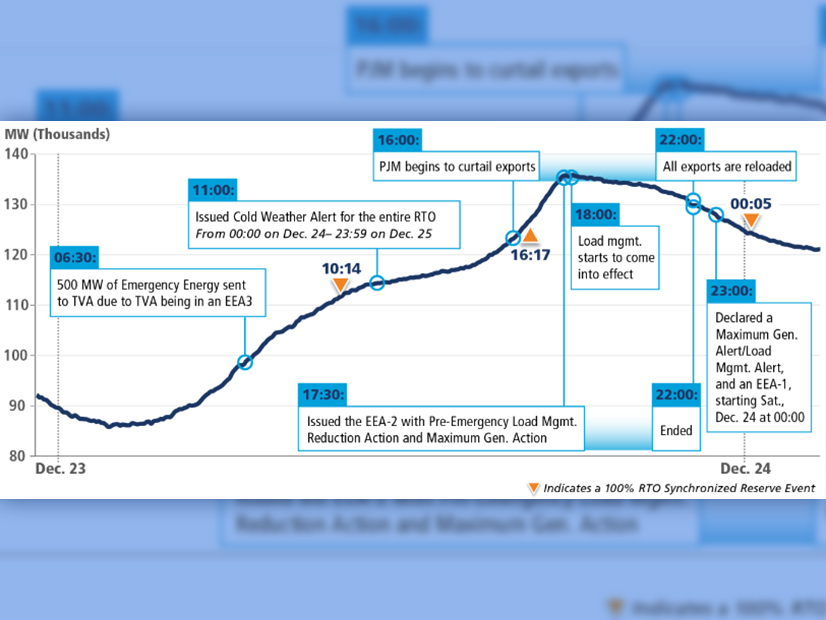
PJM has agreed to reduce its nonperformance penalties 31.7% for generators that could not meet their capacity obligations during the December 2022 winter storm.
A proposed settlement filed Sept. 29 by PJM and 81 other parties would resolve the bulk of 15 complaints generators filed against the RTO arguing that it had either improperly declared performance assessment intervals (PAIs) in regions where emergency conditions were not present or unjustifiably applied nonperformance penalties (EL23-53, et al.).
PJM did not admit to any wrongdoing or violation of its tariff in the settlement, and the agreement does not include any changes to the governing documents. The filing states that the settlement was either supported or not opposed by the “overwhelming number of active parties in the case.” (See Settlement Possible Between PJM And Several Generation Owners over Winter Storm Complaints.)
“These Winter Storm Elliott complaints had the potential to become the next ‘mega-litigation’ along the lines of the California Energy Crisis litigation or the Seams Elimination Cost/Charge Adjustment/Assignment litigation; instead, the settling parties have achieved a negotiated resolution that avoids years (or, in the case of the California Energy Crisis, decades) of litigation and now present that resolution to the commission for approval,” the filing said.
All 15 complaints would be resolved by the settlement except for portions of complaints by East Kentucky Power Cooperative (EKPC) (EL23-74) and Energy Harbor (EL23-63) to be decided by FERC. The settlement allows EKPC to pursue its request to modify its penalty charge rate and stop-loss rate.
EKPC argued that the Capacity Performance (CP) penalty rate and stop-loss limit are unjust and unreasonable by not being tied to the revenues market sellers receive through the capacity market — potentially resulting in resources being levied penalties larger than their capacity revenues. The complaint called for the commission to modify the penalty calculation to instead use the Base Residual Auction (BRA) clearing price, rather than the net cost of new entry (CONE) for both the charge rate and stop-loss. EKPC requested that the change be effective for the 2023/24 delivery year.
The PJM Board of Managers directed staff to revise the stop-loss to be based on the BRA clearing price as part of a larger reworking of the capacity market expected to be filed this month. The penalty charge rate would remain based on net CONE. (See PJM Board Releases Outline of CIFP Filing.)
The EKPC complaint also argued that PJM violated its tariff by not curtailing nonfirm exports during emergency conditions and that the company’s Bluegrass generator should be excused from penalties. EKPC agreed to drop both issues as part of the settlement.
The settlement asks the commission to “decide the merits” of Energy Harbor’s argument that PJM violated its tariff by assessing nonperformance charges against 300 MW of capacity that was unavailable due to maintenance outages. The company contended the capacity should be excused from penalties.
The settlement also includes an agreement that PJM will credit $4.4 million to Lee County Generating Station to resolve its complaint. The RTO will also extend collection of the company’s remaining penalty balance, and corresponding interest, to avoid depleting the collateral PJM holds to support Lee County’s exports to MISO.
Lee County’s complaint argued that it should not be subject to penalties, as it was on a forced outage at PJM’s request and would have been available during the PAIs if dispatchers had not requested that it go offline. In July, the commission approved a request from PJM and Lee County to defer the final six months of the company’s penalty billing schedule through June 2024 to avoid the company defaulting on its obligations in PJM and MISO (EL23-57).
The reduction applies to all market sellers assigned a share of the $1.8 billion in penalties associated with Winter Storm Elliott, including those that have already paid their penalties in full. Recipients of bonus payments — which are distributed to generators that overperformed during PAIs out of the pool of penalties collected — will be required to refund a portion of their allocation.
The penalty reduction is predicated on market sellers continuing to meet their payment obligations or already having paid off their penalties. If a party defaults or does not make a payment, the original full penalty will be reinstated with interest. Market sellers who opted for a longer nine-month repayment timeline, which comes with the tradeoff of being subject to interest, will have the interest due on their penalties recalculated to use the lower settled figure. Interest will not be due on the bonus payment refunds. (See “FERC Approves Alternative Billing Schedule,” PJM: Elliott Nonperformance Penalties Total More Than $1.8B.)
PJM will also re-evaluate the collateral each market participant must provide PJM to take into account the reduced penalties. Parties that have paid off their charges in full will have their collateral released under the settlement.
The settlement is contingent on FERC approval “without material modification or condition,” and it states that the filing will be withdrawn unless the settling parties agree to any modifications the commission may condition its approval on. The filing requests commission approval no later than Dec. 29 and use of the default comment period, which would make responses due Oct. 19.
“Timely commercial certainty is a core objective of the settlement, and that objective would be significantly undermined if the commission does not approve the settlement by the end of this calendar year,” the filing said.
On Oct. 25, the commission granted a tariff waiver PJM and several complainants requested to allow the RTO to delay collection of unbilled penalties and distribution of bonuses until the settlement is acted upon by the commission and can be implemented by PJM. The order stated that delaying billing would be “administratively efficient” by reducing the potential for rebilling and resettlement should the settlement be accepted and result in a change in the penalties due.



